Grid expansion
A successful energy transition – not least as set out in the Paris climate targets – requires not just accelerated development of renewable energies but also the expansion of the power grids. To this end, energy industry legislation is to be adapted so as to achieve a consistent approach to grid expansion. This was approved by the Federal Cabinet.
2 min reading time

The focus on renewable resources in connection with the energy transition also requires an expansion of the power grid in Germany
Photo: picture-alliance/dpa/Büttner
The development of renewable energies and the expansion of the power grid must go hand in hand. This is particularly important in view of the phase-out of nuclear power and coal-fired power generation along with the anticipated increase in energy consumption due to electromobility and heat pumps, for example.
The switch to renewable energies, especially wind power, requires additional overland lines that are capable of transporting electricity over long distances. Power supply bottlenecks have to be eliminated. Last but not least, the technical basis has to be established to account for the fact that electricity trading is increasingly carried out across borders.
Climate neutrality remains a consistent target
In order to accelerate the energy transition, the Federal Government has firmly anchored the target of greenhouse gas neutrality by 2045 in the Energy Industry Act. This law supplements grid development plans with the calculation of a climate-neutral grid.
Meanwhile, amendments to the Energy Industry Act, the Federal Requirements Plan Act and the Grid Expansion Acceleration Act serve to promote speedy implementation of planning and approval procedures, implementation and operation in connection with power grids.
Planning at distribution grid level is also consistently aligned with the goal of forward-looking and efficient demand assessment. Among other things, the aim is to allow for the anticipated increase in demand for power in connection with electromobility.
The grid connection is also to be accelerated by means of increased digitalisation and standardisation so as to ensure efficient management of the expected bulk business with PV roof systems, heat pumps and charging points for electric vehicles. By facilitating the introduction of weather-dependent overhead line operation, the aim is also to enable the existing power grid infrastructure to be utilised more fully.
Improvements in the rights of gas and electricity customers
A new distinction is now made between substitute supply and basic supply in the legislation governing the supply of electricity and gas to end customers. In addition, price linkage between the two instruments has been removed and there are now additional requirements in terms of transparency. As a result, the Federal Network Agency has to be notified of any scheduled termination of energy supply to household customers at least three months in advance; the customers concerned have to be informed. The Federal Network Agency has been invested with additional supervisory powers over energy suppliers for this purpose.
Finally, the Act against Restraints of Competition is also to be amended. Refineries and the fuel trade are to be monitored more closely by the Market Transparency Unit for Fuels at the Federal Cartel Office, and the database of this unit is being expanded to include volume data.
The Act does not require the consent of the Bundesrat.